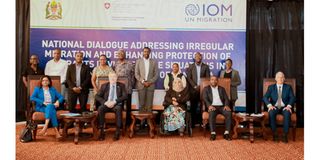Zanzibar reports rise in irregular migration of children from the Mainland

What you need to know:
- Permanent Secretary in the Ministry of Community Development, Gender, Elderly, and Children of the Revolutionary Government of Zanzibar, Ms Abeida Rashid said recently that last year, 66 children were discovered on the streets after arriving through illegal routes from the mainland to Zanzibar
Dar es Salaam. The government has said there is a rise in irregular migration of children from mainland Tanzania to Zanzibar, primarily driven by poverty and mistreatment.
Permanent Secretary in the Ministry of Community Development, Gender, Elderly, and Children of the Revolutionary Government of Zanzibar, Ms Abeida Rashid, made this statement on July 23, 2024 during the National Dialogue on Addressing Irregular Migration and Enhancing the Protection of Vulnerable Migrants in Tanzania.
She said that last year, 66 children were discovered on the streets after arriving through illegal routes from the mainland to Zanzibar.
"From January to this month we found 19 who have been taken to safe houses where they receive necessary training to support themselves," she said.

Rashid emphasised ongoing efforts to provide protection and assistance services to migrant children, underscoring the challenges faced by social welfare and immigration officers in handling cases of irregular migration among children and adults alike.
"The government remains steadfast in ensuring their protection despite the challenges, with safe houses playing a crucial role in delivering essential protection services and setting a precedent for addressing the needs of vulnerable migrants."
"This national dialogue exemplifies our commitment to fostering platforms where stakeholders and government bodies can collaboratively address critical migration issues," she added.
"Migration is a global phenomenon that impacts us all," Rashid said, adding that Tanzanians seek opportunities abroad, while Tanzania also hosts migrants from around the world.
She reaffirmed the government's commitment to safe, orderly, and dignified migration, as reflected in policies designed to protect migrants, especially those in vulnerable situations.
She highlighted collaborative efforts with the International Organisation for Migration (IOM) Tanzania and the Revolutionary Government of Zanzibar in operationalizing safe houses for trafficking victims.
Addressing irregular migration and enhancing protection for vulnerable migrants is a shared responsibility, stressed Rashid, emphasising ongoing awareness campaigns in Zanzibar and mainland Tanzania to educate communities about the risks associated with irregular migration.
The Head of the UN Resident Coordinator's Office in Tanzania, Shabnam Mallick, underscored migration's global impact on societies and economies.
She cited UN statistics showing 281 million international migrants, or 3.6 percent of the global population, emphasising both opportunities and challenges for those in vulnerable situations.
Mallick pledged the UN's support to help unravel migration complexities in Tanzania, aligning with Sustainable Development Goals (SDGs) principles to ensure no one is left behind.
"Migrants contribute to multiple SDGs, including reducing inequalities, promoting decent work and economic growth, and strengthening institutions," he noted, advocating collaborative efforts to generate actionable recommendations for effective migration management and protection of vulnerable migrants in Tanzania.
"Women constitute 48 percent of the global migrant population, with approximately 36 million child migrants worldwide," she said.
She stressed Africa's role as host to 25.4 million international migrants, with significant intercontinental migration.




